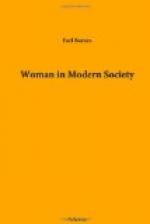To the man, family life, of the kind we are considering, brings a vital connection with the past and the future. Reputation, possessions, friends, all become deeply significant when a man becomes a link in the generations of men. In establishing his material home, and modifying it to the changing conditions of the family; in building up a social setting for the group; in projecting his work and his service into the future, he is held to highest standards by the fact that he is working with the partner of his choice, and for interests that are in harmony with the constitution of the universe.
Of the greater physical health of married people there can be no doubt. Statistics all show the greater longevity of married people, and insurance companies recognize it. The celibate type of physical degeneration is so well differentiated that it can generally be recognized even among strangers, at least after forty.[57] On the moral side, too, very few criminals are found among married people.
[57] ARNOLD LORAND, Old Age Deferred. The Cause of Old Age and its Postponement by Hygienic and Therapeutic Measures. F.A. Davis Co., 1911.
If children come to bless these homes of men and women, then even intellectual life may shift to a higher level than was before possible. With advancing years intellectual interests tend to become specialized. The man or woman gives up singing, ceases to be interested in plant life, stops reading poetry. One activity after another is cut off and interests concentrate in some comparatively small field of work or pleasure. But when a child comes, the parents are forced to start over the round of human interests and thought once more. Before, they lived it as children; now, they live the cycle as grown men and women.
No matter how completely a woman has given up music, she will some day find herself singing when she holds her baby in her arms. As she recites Mother Goose and the fairy and folk-lore tales, she moves through the path of man’s upward progress, led by a child, but with the life and understanding of adult years. As she walks with her child in the garden and in the fields, she is driven to a new interpretation of the world of nature. Few things can so broaden, quicken and enrich the intellectual life as growing up with one’s children.
On the social side, a parent who has children is forced to live in all the social world around him. The water-supply, the sewage, pure foods, vacant lots, paving, fast driving in the streets, police protection, undesirable residents, saloons and churches, schools and libraries—everything that touches the social well-being—touches him vitally and imperatively. The foot-loose celibate can always go away. The parent finds it difficult to leave the place where he has planted his roof-tree. Of course, there are many unmarried people, and people who are childless, who live this domestic life vicariously through friends or other people’s children. One cannot but be grateful that life is so organized that no woman can be entirely shut off, unless she wills it, from the fructifying life that knits together the generations of the old and the young.




